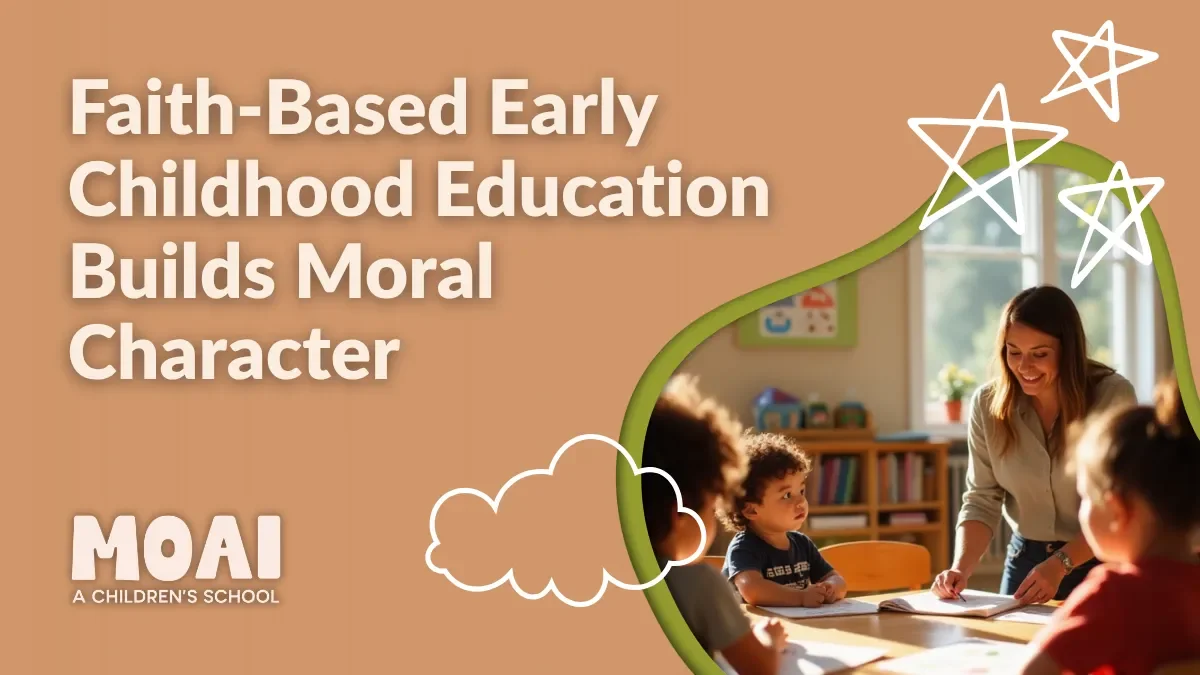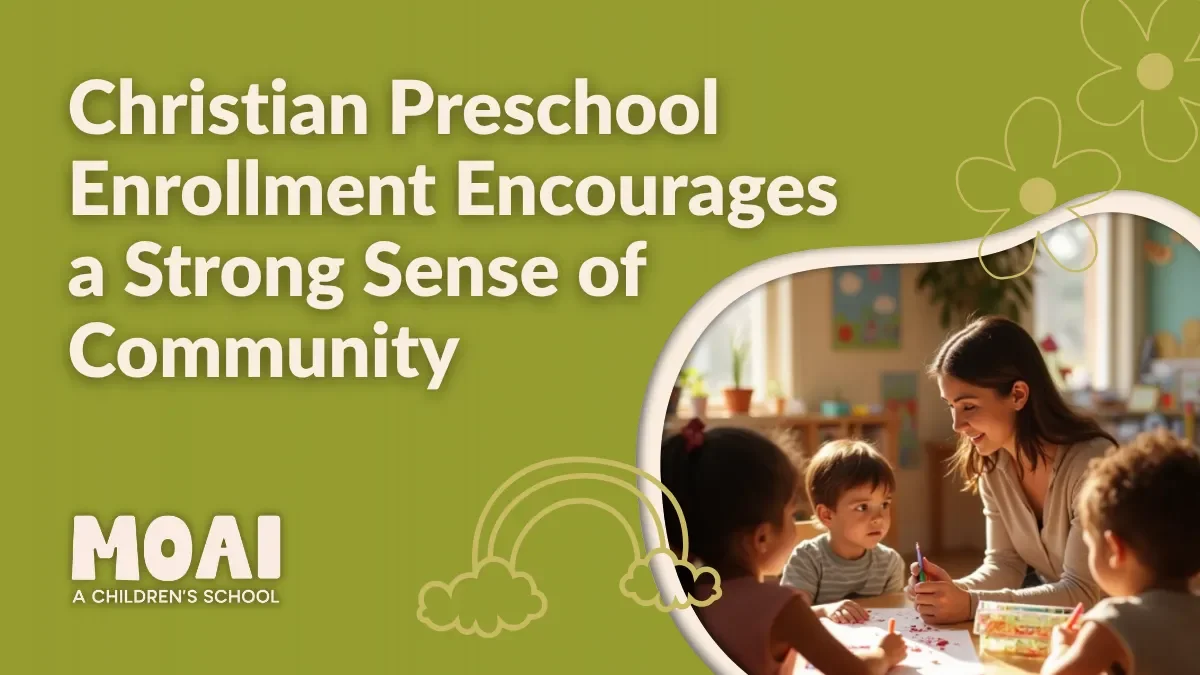7 Powerful Reasons to Choose a Christian Preschool in Seattle for Your Child's Growth
Choosing a Christian preschool Seattle families can trust significantly shapes a child's early development. These programs offer more than academic readiness—they provide a strong moral foundation rooted in Christian values such as kindness, compassion, and respect. In an environment where faith is integrated with learning, children develop a sense of purpose and belonging from an early age.
For parents seeking both spiritual and educational growth, Christian preschools foster a supportive atmosphere that nurtures the whole child—emotionally, intellectually, and spiritually. The following seven reasons highlight why enrolling your child in a Christian preschool in Seattle can positively impact their development and future character.
1. Faith-Based Early Childhood Education Builds Moral Character
Faith-based early childhood education provides a strong ethical foundation during a child's formative years. At a Christian preschool, children are introduced to values such as kindness, honesty, patience, and forgiveness through structured lessons and everyday interactions. These values are not simply taught but modeled by educators and reinforced through group activities, storytelling, and prayer.
Incorporating faith into daily learning helps children:
Develop empathy: Understanding biblical principles encourages compassion for others
Learn accountability: Children begin to recognize right from wrong and accept responsibility for their actions
Practice gratitude: Through faith, children learn to appreciate what they have and express thankfulness
Build self-respect and respect for others: Christian teachings emphasize the necessity of treating everyone with dignity
Cultivate inner strength: Faith offers reassurance and comfort, helping children navigate challenges
These moral principles guide young learners in their relationships with peers and adults, fostering positive social behaviors and emotional growth. The character development nurtured through faith-based education equips children with the tools they need to thrive in school and life, forming the groundwork for integrity, humility, and leadership that extends well beyond the preschool years.
2. Seattle Christian Early Learning Supports Academic and Spiritual Growth
Seattle Christian early learning programs are designed to support both cognitive development and spiritual formation. These dual goals are integrated into the curriculum, allowing children to grow intellectually while deepening their understanding of faith. Academic subjects such as literacy, math, and science are taught through developmentally appropriate methods that encourage curiosity and problem-solving while incorporating Christian values and biblical stories.
Key areas of growth include:
Early Literacy and Language Skills: Children engage with faith-based books, songs, and conversations that strengthen vocabulary and comprehension
Mathematical Thinking: Foundational math skills are introduced through counting, sorting, and pattern recognition within a meaningful, values-based context
Creative and Critical Thinking: Art, music, and hands-on exploration encourage children to think creatively while reflecting on Christian themes
Spiritual Awareness: Daily prayer, scripture readings, and lessons about God foster a growing sense of purpose and connection
Social and Emotional Learning: Biblical teachings are used to help children manage emotions and interact respectfully with others
By combining academic instruction with faith-based experiences, Christian early learning in Seattle cultivates well-rounded development. Children gain the knowledge and the moral framework needed to enter kindergarten confidently and with a strong spiritual identity.
3. Christian Preschool Enrollment Encourages a Strong Sense of Community
Christian preschool enrollment provides families with more than just a place for early education—it offers entry into a supportive and value-driven community. In Christian learning environments, children and their families are surrounded by peers with fairly similar beliefs and principles, creating a sense of unity and belonging that enhances the preschool experience.
Benefits of a strong school community include:
Shared Values and Purpose: Families and staff work together under a common spiritual mission, promoting consistency between home and school life
Parent Involvement Opportunities: Many Christian preschools offer family-centered events, prayer groups, and volunteer roles that encourage deeper engagement
Positive Peer Relationships: Children build friendships based on mutual respect and compassion, guided by Christian teachings
Supportive Teacher-Family Partnerships: Educators maintain open communication and work collaboratively with parents to nurture each child's development
Emotional and Spiritual Security: A faith-filled community provides children with the confidence to express themselves, ask questions, and grow in their beliefs
By enrolling in a Christian preschool, families become part of a nurturing environment where collaboration, trust, and faith are foundational. This sense of community fosters emotional stability and reinforces the values taught, making it a vital aspect of early education.
4. Qualified Educators Offer Holistic Development Opportunities
At a Christian preschool, qualified educators are critical in nurturing every aspect of a child's growth—academic, emotional, social, and spiritual. These teachers are trained in early childhood education and committed to integrating Christian principles into daily instruction. Their dual focus ensures that children are supported as individuals, not just students.
Educators foster holistic development through the following:
Faith-Based Instruction: Lessons are enriched with biblical values, helping children understand kindness, patience, and respect in practical terms
Individualized Learning Approaches: Teachers recognize each child's unique strengths and tailor instruction to support personal growth and confidence
Social Skill Building: Classroom routines emphasize cooperation, sharing, and empathy, guided by a Christ-centered worldview
Creative and Cognitive Engagement: Activities in art, music, and problem-solving encourage children to express themselves while developing foundational academic skills
Safe and Nurturing Relationships: Educators create consistent, loving environments that help children feel secure and valued
Children are encouraged to explore the world with curiosity, grounded in faith and compassion through their guidance. The impact of qualified, mission-driven educators extends beyond the classroom, laying the foundation for a child's lifelong love of learning and moral development.
5. Safe, Nurturing Environments Grounded in Christian Values
A Christian preschool prioritizes creating a safe, structured, and emotionally supportive setting where children can learn and grow confidently. These environments are intentionally shaped by Christian values that promote respect, kindness, and responsibility, establishing clear expectations for behavior and interaction. Children are taught to treat others compassionately, resolve conflicts, and express their thoughts respectfully.
Key aspects of a value-based environment include:
Consistent Routines and Boundaries: Predictable schedules and respectful discipline create a sense of stability and trust
Emotionally Supportive Classrooms: Teachers model empathy, actively listen to children's concerns, and encourage healthy emotional expression
Respect for Every Child: Individual dignity is upheld, affirming each child's worth as a unique creation of God
Christian-Based Conflict Resolution: Children are taught to apologize, forgive, and restore relationships using age-appropriate biblical principles
Clean, Secure Facilities: Physical safety is maintained through secure access points, attentive supervision, and cleanliness
By grounding daily operations in Christian values, preschools ensure that children feel protected and grow in a setting that reinforces the importance of love, integrity, and accountability. This foundation supports both emotional well-being and moral development during early childhood.
6. Children Learn to Serve and Respect Others Early On
Christian preschools strongly emphasize teaching children the importance of service and respect as daily practices. From a young age, children are introduced to the idea that caring for others reflects their faith. Students are encouraged to show kindness, share resources, and act humbly through structured activities and organic classroom moments.
Key components of learning service and respect include:
Service-Oriented Activities: Simple tasks such as classroom chores, helping a friend, or making cards for others foster a mindset of helpfulness
Biblical Role Models: Stories from scripture provide clear examples of compassion, generosity, and humility for children to emulate
Inclusive Classroom Culture: All students are treated equally, promoting empathy, acceptance, and consideration of others' needs
Guided Social Interaction: Teachers use every opportunity to reinforce respectful behavior in speech, actions, and play
Celebration of Others' Strengths: Children learn to appreciate and support each other's differences and achievements
By nurturing these habits early, Christian preschools help children internalize the values of service and respect as essential parts of their character. This development strengthens peer relationships and lays the foundation for responsible citizenship and ethical decision-making.
7. A Lasting Foundation for Lifelong Learning and Faith
Christian preschool programs are designed to instill values and habits that extend far beyond the early years. These schools prepare children for intellectual and moral lifelong success by combining academic readiness with spiritual formation. The early introduction to faith-based principles fosters a deep-rooted understanding of purpose, integrity, and responsibility that continues to guide students throughout their education and personal lives.
Long-term benefits of Christian preschool include:
Academic Preparedness: Children develop early literacy, math, and problem-solving skills that support future learning.
Strong Moral Compass: Biblical teachings guide ethical thinking and decision-making.
Spiritual Identity: Children grow in understanding faith, prayer, and relationship with God from a young age.
Resilience and Confidence: Faith-centered instruction encourages perseverance and self-assurance during challenges.
Lifelong Love of Learning: A balanced approach to curiosity and values helps students maintain enthusiasm for knowledge and personal growth.
These combined outcomes establish a firm foundation that shapes a child's academic path and worldview. Christian preschool equips children to engage the world with wisdom, compassion, and a devotion to lifelong learning rooted in faith.
Conclusion
Choosing a Christian preschool in Seattle is a meaningful decision that supports your child's complete development—academically, spiritually, and emotionally. From strong moral guidance to compassionate teachers and a faith-centered community, the benefits of Christian early education are lasting and transformative. Children gain critical learning skills and build the character and confidence they need to thrive in all areas of life. With a foundation rooted in love, respect, and purpose, your child will be well-prepared for school and the world beyond.
Ready to explore the next step in your child's growth? Contact us today at admissions@moaischool.com to learn more about enrollment at Moai School.


